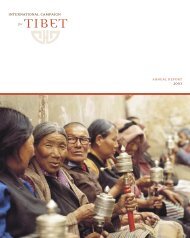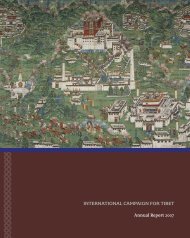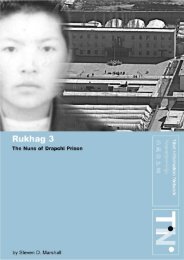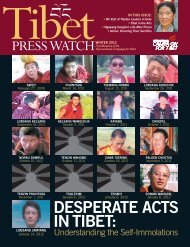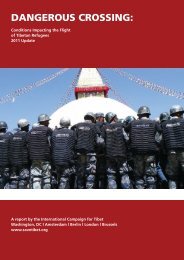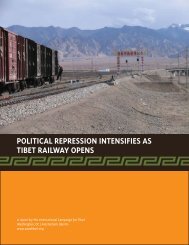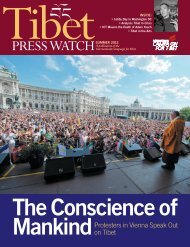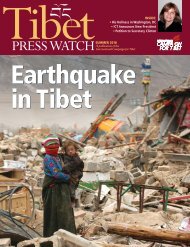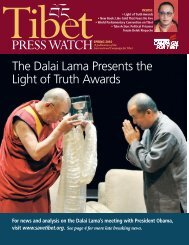download the report - International Campaign for Tibet
download the report - International Campaign for Tibet
download the report - International Campaign for Tibet
Create successful ePaper yourself
Turn your PDF publications into a flip-book with our unique Google optimized e-Paper software.
TIBET AT A TURNING POINT: THE SPRING UPRISING AND CHINA’S NEW CRACKDOWN<br />
taking over from Zhu Weiqun, and Ms Liu Yandong, <strong>the</strong> <strong>for</strong>mer head of <strong>the</strong> UFWD.<br />
Zhu Weiqun has been a Deputy Director of <strong>the</strong> UFWD since 1998; however, he has a<br />
long involvement in <strong>Tibet</strong> dating back to 1991 when as a journalist on <strong>the</strong> People’s<br />
Daily he spent 40 days in <strong>the</strong> TAR covering official celebrations to mark <strong>the</strong> 40th anniversary<br />
of <strong>the</strong> “peaceful liberation” of <strong>Tibet</strong>. Between 1994 and 1996, Zhu “participated<br />
in <strong>the</strong> work relating to <strong>the</strong> reincarnation of <strong>the</strong> Panchen Lama”, according to<br />
biographical material on him <strong>report</strong>ed in <strong>the</strong> pro-Beijing Hong Kong media. 34 The article<br />
did not offer any details on what his involvement in <strong>the</strong> process may have been.<br />
Former Minister of Public Security, Zhou Yongkang<br />
Although now apparently retired from any position with a direct mandate on <strong>Tibet</strong>,<br />
Zhou Yongkang’s impact in <strong>Tibet</strong> is likely to resonate <strong>for</strong> many years to come. Zhou<br />
served on <strong>the</strong> Central <strong>Tibet</strong> Work Coordination Working Group between 2002 and<br />
2007 while he was Minister <strong>for</strong> Public Security, and was Party Secretary of Sichuan<br />
province, which includes large parts of <strong>the</strong> eastern <strong>Tibet</strong>an region of Kham, at <strong>the</strong><br />
time of <strong>the</strong> sentencing to death of an influential <strong>Tibet</strong>an monk, Tenzin Delek Rinpoche.<br />
As Sichuan Party Secretary, he also oversaw <strong>the</strong> drastic reduction in size of two<br />
important monastic encampments, including <strong>the</strong> expulsion of monks, nuns and Chinese<br />
Buddhists, that had played a pioneering role in <strong>the</strong> revival of <strong>Tibet</strong>an Buddhism<br />
following <strong>the</strong> Cultural Revolution.<br />
During his tenure as Party Secretary of Sichuan province from 1999 to 2002, Zhou<br />
Yongkang was unequivocal in his disregard <strong>for</strong> minority cultures, even going so far as<br />
to dismiss <strong>the</strong>ir religious beliefs, practices, and <strong>the</strong>ir languages almost entirely. Soon<br />
after assuming <strong>the</strong> post of Party Secretary in Sichuan, he was quoted as saying that<br />
<strong>Tibet</strong>ans were “wasting” <strong>the</strong>ir money by giving donations to monasteries, that “promoting<br />
religious freedom has caused people so much hardship”, and that teaching<br />
<strong>the</strong> <strong>Tibet</strong>an language to <strong>Tibet</strong>an children “is such a heavy burden” on government<br />
finances — “why bo<strong>the</strong>r.” 35<br />
Zhou’s stance marked an unmistakeable reversal of <strong>the</strong> more conciliatory approach to<br />
<strong>Tibet</strong> and <strong>Tibet</strong>an culture which had been adopted by <strong>for</strong>mer Party General Secretary<br />
Hu Yaobang in <strong>the</strong> early 1980s, and set <strong>the</strong> Party on an aggressive and confrontational<br />
path with <strong>Tibet</strong>an culture in Kham — <strong>the</strong> <strong>Tibet</strong>an province largely incorporated into<br />
Sichuan. This approach is in contrast to <strong>the</strong> provisions of <strong>the</strong> Regional Ethnic Autonomy<br />
Law, which ostensibly allows <strong>Tibet</strong>ans to use and develop <strong>the</strong>ir language, including<br />
in <strong>the</strong> affairs of local government, not to mention recognizing religious<br />
114



